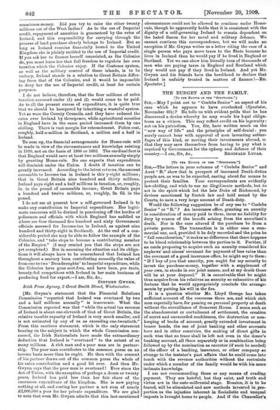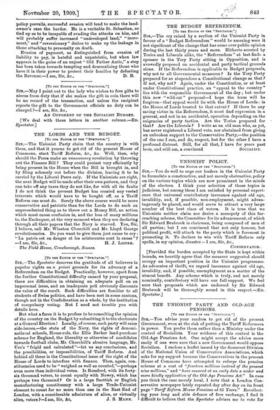[TO THY EDITOR 07 TEl srzerima."] Sra,—The letters in your
columns of " Coelebs Senior" and Aunt "B." show that in prospect of increased Death-duties people are, as was to be expected, casting about for means to protect their families. Your correspondents are evidently law-abiding, and wish to use no illegitimate methods, but to act in the spirit which led the late Duke of- Richmond, by devices sanctioned by Scotch law and held sound by the Courts, to save a very large amount of Death-duty.
Would the following suggestion be of any use to " Coelebs Senior" or "R." P An insurance office, granting an annuity in consideration of money paid to them, incur no liability for duty by reason of the benefit arising from the annuitant's death. Nor is the case altered if the purchase be from a private person. The transaction is in either case a com- mercial one, and, provided it be duly recorded and the price be "full consideration," it makes no difference that there happens to be blood relationship between the parties to it. Further, if an uncle proposing to acquire such an annuity considered his nephews' and nieces' covenant for payment of less value than the covenant of a good insurance office, he might say to them: "If I buy of you that annuity, you ought for my security to invest the purchase-money, together with a supplement of your own, in stocks in our joint names, and at my death these will be at your disposal." It is conceivable that he might thus acquire from his relatives an annuity so exhaustive of his fortune that he would appropriately conclude the arrange- ments by putting his will in the fire.
It is a question whether Mr. Lloyd. George has taken sufficient account of the resources there are, and which risk men especially have, for passing on personal property at death without the surveillance of Somerset House. I mean such as the abandonment or curtailment of settlement, the creation of secret and unrecorded confidences, the destruction or non- keeping of books of account, greatly extended investment in bearer bonds, the use of joint banking and other accounts here and in other countries, the making of direct gifts in such wise that no trace shall be left not even in the donor's banking account, all these separately or in combination being followed up by the nomination as executor (if such be needed) of the officer of a banking, insurance, or other company so strange to the testator's past affairs that he could come into touch with the revenue authorities without the restraints under which a member of the family would be with his more intimate knowledge.
I am not recommending these or any means of evading payment. They are hateful, but they exist, and truth and virtue are in the ante-millennial stage. Evasion, it is to be feared, will be stimulated and new methods invented in, pre- portion as the injustice inherent in Socialistic and unequal imposts is brought home to people. And if the Chancellor'
policy prevails, successful evasion will tend to make the land- owner's case the harder. He is a veritable St. Sebastian, so tied up is to be incapable of evading the attacks on him, and will probably suffer increased "undeveloped land," "incre- ment,' and "reversionary" duties to make up the leakage in those attaching to personalty on death.
Evasion of payment, as distinguished from evasion of liability to pay, is hateful and unpatriotic, but when law appears in the guise of an unjust "Old Father Antic," a step has been taken towards tempting and demoralising those who have it in their power to protect their families by defeating

























































 Previous page
Previous page